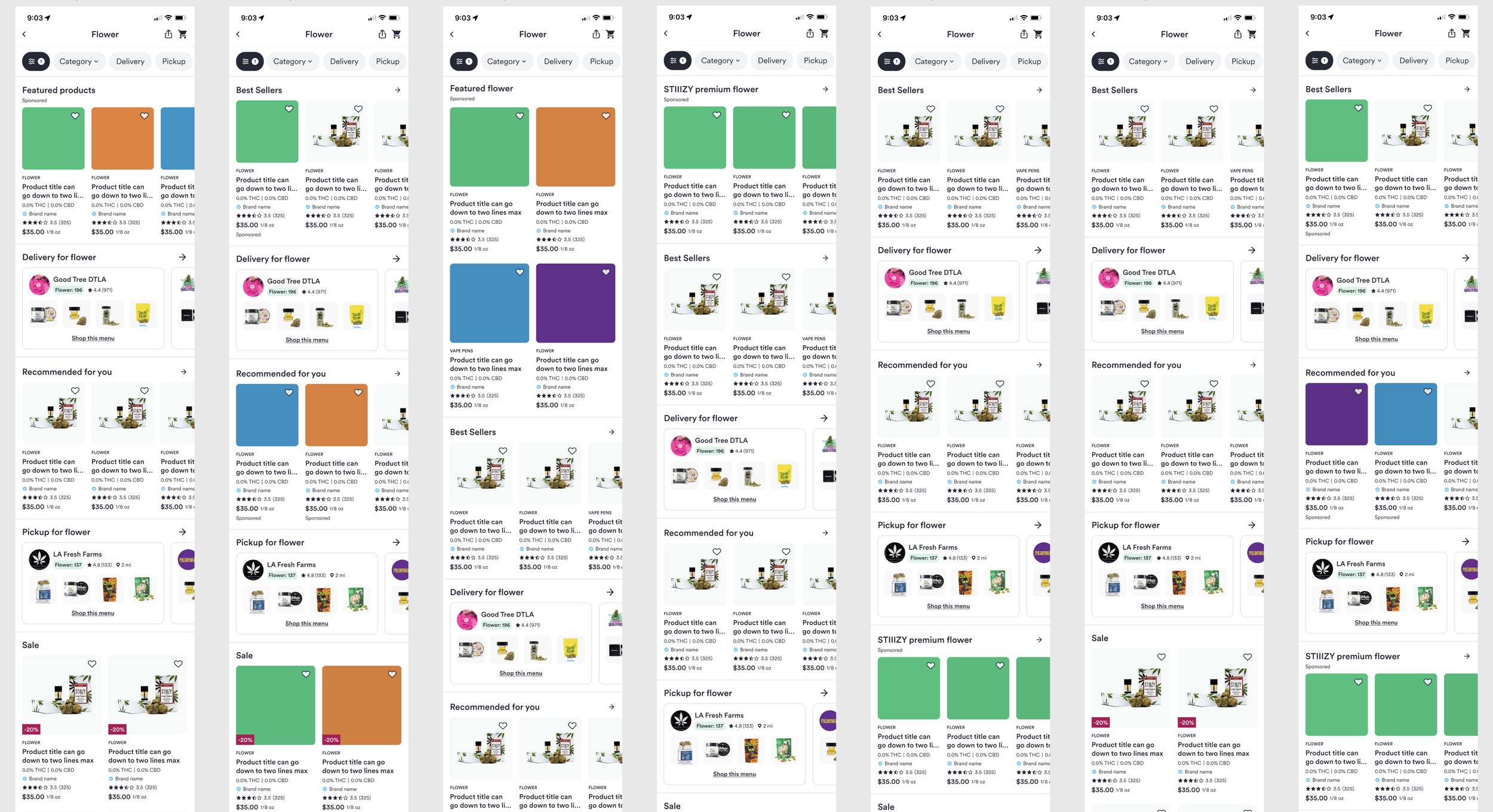Monetization strategy for category landing pages
As part of the Monetization and Ad Tech team at Weedmaps, I led the design of a new revenue strategy focused on enhancing category landing pages through integrated advertising. This included the design and testing of sponsored product placements and premium display formats bridging marketplace UX with monetization goals.
The Challenge
Weedmaps had a robust in-house ad server, but the traditional display ad formats were underperforming in terms of user engagement and click-through rate.
The monetization team needed a solution that could:
Seamlessly integrate into the core user experience
Offer meaningful performance lift for advertisers
Be scalable across product surfaces and verticals
Goals
Increase ad performance on high-traffic pages
Expand inventory beyond basic display banners
Design ad experiences that feel native and shoppable
Equip internal Ad Ops teams with flexible tools for campaign creation
My role
Anticipating the need for more flexible and performant ad formats, I joined a team of staff engineers during an internal hackathon to prototype a new sponsored product ecosystem ultimately leading end-to-end design across the entire experience, from consumer-facing ad units and campaign creation tools to backend admin UIs for Ad Ops and client-facing interfaces for launching product- or category-based campaigns.
Designed new ad formats and campaign architecture
Built internal dashboards and tools for Ad Ops to manage campaigns
Led cross-functional testing initiatives with engineering, data science, and product marketing
Developed end-to-end UX for advertisers, operations, and consumers.
I collaborated closely with the UXR team to better understand user perception and interaction with various visual treatments of ad units and sponsored products on category landing pages. Together, we designed and ran a series of moderated research sessions aimed at testing multiple layout and integration styles from subtle native placements to more distinct, branded formats. The goal was to strike a balance between monetization and maintaining a seamless user experience.
These sessions helped surface valuable qualitative insights that directly informed our design decisions, ensuring the final approach was user-centric while supporting business objectives.
Partnered with UXR to develop research goals, session scripts, and testing criteria.
Designed multiple visual concepts for ad and sponsored product placements within landing page layouts.
Partnered on moderated feedback sessions with real users to gauge perception, clarity, and trust.
Delivered a final design direction that improved ad engagement without compromising the core shopping experience.
Research & Insights
Design process
Design process
1. Internal Tools for Sponsored Campaign Management
To power this new monetization layer, I designed UI and workflows for internal dashboards that allowed Ad Ops teams to:
Build and manage sponsored product campaigns
Preview placements across the app
Configure flight dates, targeting, and creative variations
These tools were critical in enabling our go-to-market strategy without reliance on engineering for every change.
2. Designing and Testing New Ad Formats
We ran a series of experiments on category landing pages to evaluate the effectiveness of different ad units:
Standalone Sponsored Carousels
Featured mixed-brand sponsored products in a horizontally scrollable format
Clearly labeled but native in feel
Served as the foundation for evaluating product-level CTRs
Result: 7x increase in CTR compared to standard display ads.
Sponsored Product Injection into Organic Carousels
Sponsored products were algorithmically blended into personalized organic product listings
Leveraged machine learning to avoid repetitiveness and respect user preferences
Served as the foundation for evaluating product-level CTRs
Result: Lifted CTR while preserving a seamless UX—paving the way for broader rollout across the app.
New formats including Brand Takeovers
Full-screen video units on landing pages with embedded “Shop This Video” functionality
Users could browse and purchase products featured in the video directly from the ad
High-impact format used for special events and key brand partnerships
Outcome
The promising early results from the standalone carousel experiment especially the 7x CTR improvement validated the opportunity.
The project matured into a comprehensive monetization layer across the Weedmaps app, including:
Sponsored placements in search, category, and product detail views.
Scalable UI and tooling for internal ad operations.
A new ad strategy that aligned user engagement with advertiser goals.
Internal tooling adoption by Ad Ops for campaign creation and management.
Scalable design system that extended to additional monetization experiments (like product spotlight and video drop promos).
Projected growth in the following categories:
Customer retention
Client display ad ROI
Repeat shopper rate
Customer and client engagement
Conversion
A new opportunity
At Weedmaps, campaigns aren’t self-serve — they’re manually built and managed by our Ad Operations team. I identified an opportunity to streamline this process by creating a microservice app that empowers brands to explore and configure the most effective ad formats aligned with their specific goals, reducing operational friction and improving outcomes.
Client facing micro service to build goal based campaigns
AI-powered chatbot that guides users through a conversational flow to understand their advertising goals (e.g., product awareness, traffic, conversions)
Help clients promote their cannabis business more effectively with minimal friction
Recommends a customized package of Weedmaps ad formats based on goals, budget, and targeting needs



